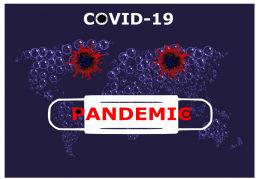What to Know About COVID-19
What is COVID-19?
COVID-19 is a disease that is transmitted by respiratory secretions. It is a novel, or new, strand of the coronavirus. COVID-19 is from the same family of MERS and SARS and thought to have originated as an animal coronavirus that infected people and then spread from people to people.
SARS-COV-2, which is a betacoronavirus, is the virus that causes COVID-19. COVID-19 is abbreviated for coronavirus disease 2019.
The disease classification has changed from an outbreak to epidemic to now a pandemic. The differences are how fast and quickly it can spread across a region. It is a world pandemic and as of today has spread to every continent except Antarctica. Because there is little to no immunity the virus is able to spread worldwide.
How is it transmitted?
COVID-19 is a respiratory infection that can be transmitted from respiratory droplets of infected people who cough or sneeze. Therefore, the CDC recommends people to stay at least 6 feet away from each other and not in direct contact. Some people may spread the virus prior to feeling symptoms. Additional ways of contracting the virus is from touching the surface or object that may have the virus and then touching your own mouth, nose or eyes.
Who is most at risk?
Since this virus is new, everyone is considered at risk. There are certain populations that are considered higher risk than others. This includes the elderly, infants, immunocompromised patients and anyone with an underlying condition, such as asthma or diabetes. This is a large population and it is important to be aware of the symptoms.
What are symptoms of COVID-19?
It may take days until symptoms do occur, anywhere from 2 to 14 days after exposure. Symptoms include a fever, dry cough, and itchy throat. Severe cases include difficulty breathing, requiring a respirator to help them breath. Call your doctor immediately if you think you have been exposed to COVID-19 and develop symptoms. The CDC states that emergency symptoms include: difficulty breathing or shortness of breath, persistent pain or pressure in the chest, new confusion or inability to arouse and bluish lips or face. Immediately seek medical help by calling your doctor if you think you have been exposed and are experiencing symptoms.
